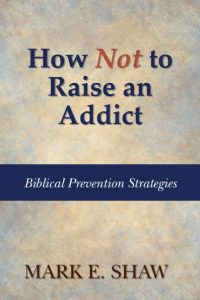Addict? Is your child at risK? In Mark Shaw’s booklet How Not to Raise an Addict, you learn the 5 mentalities that makes a kid susceptible to addiction. Reviewed by Ellen Castillo, whose review appeared first here at the Biblical Counseling Coalition.
Your Parenting Matters
Mark Shaw has written a booklet that is excerpted from his more in-depth book Addiction Proof Parenting: Biblical Prevention Strategies. In this booklet, Mark gives us an overview of the five basic mentalities of “addictive” thinking. He believes that when children develop these mentalities, it can lead to addictive choices and behaviors later in life.
Mark presents a challenge to parents as they disciple their children. By walking them through the five mentalities, he gives us a roadmap for determining if our parenting encourages unbiblical thinking that could lead to addictive behavior down the line.
He begins with an important discussion of the need for mind-renewal (Rom. 12:2; Eph. 4:23). Mark states,
We are all in need of transformed thinking so that we can discern the acceptable and perfect will of God. In other words, transformed thinking enables us to know what pleases God and benefits us when we actually put these things into practice (p. 2).
The Five Mentalities
The bulk of the booklet gives us a brief but fairly in-depth view of these five mentalities:
- Entitlement mentality (thinking everything is deserved)
- Consumer mentality (acquiring what he perceives is deserved)
- Victim mentality (when he thinks his entitlement and consumer needs are not being met, he feels he is a victim of unfairness so he blames others)
- Perishing mentality (a victim feels self-pity and “learned helplessness” that leads to rebellion)
- Rebellious mentality (“why should I try” attitude, leading to foolishness and a desire to be his own boss)
These mentalities all build upon each other, according to Mark’s understanding of addictive thinking (p.1).
Mark offers us the biblical antidotes for the mentalities he presents. He unpacks these for us, which is helpful and insightful. He teaches us that cultural parenting is counterproductive if we want to raise biblical thinkers.
Recognize Yourself?
As you read this booklet, you may recognize yourself in some of these mentalities (as I did). The booklet gives us tools to examine our own hearts as parents and counselors. This way we can recognize unbiblical thinking in our children and in our counselees and their parents. He also lays out a path for how to instill biblical concepts in order to counter the culture our children experience.
Mark walks us through much Scripture, which is what I appreciated most about this booklet. He shows us that the Bible is truly sufficient to inform our thinking as well as our parenting. He not only offers instruction for us, but he also offers encouragement and reminders of God’s grace.
Also he tells the reader that “Scripture teaches that God is sovereign, but man is also responsible” (p. 35). This encourages parents to be faithful in their child’s discipleship, but to understand that the outcomes are not up to them, as the child grows to make their own choices. The principles he encourages us to teach our children are biblical and that is what parents are called to be faithful to.
A Guide for Biblical Thinking
 Mark also gives us a brief overview of his biblical view of addiction. Addictions do not give us an escape from personal responsibility, and calling addiction a “disease” does not change this (p.35). His teaching has impacted me personally (as well as my counseling ministry) as I have been challenged to view addiction biblically. If you have not taken an in-depth look at a biblical view of addiction, I encourage you to read Mark’s books on addiction. He has become my go-to resource when I encounter addictive behavior in my counselees of all ages.
Mark also gives us a brief overview of his biblical view of addiction. Addictions do not give us an escape from personal responsibility, and calling addiction a “disease” does not change this (p.35). His teaching has impacted me personally (as well as my counseling ministry) as I have been challenged to view addiction biblically. If you have not taken an in-depth look at a biblical view of addiction, I encourage you to read Mark’s books on addiction. He has become my go-to resource when I encounter addictive behavior in my counselees of all ages.
This booklet is a helpful guide for counselors who are working with parents as they disciple their children to think and live biblically. Parents would benefit from utilizing the booklet as a guide towards changing their approach in their parenting. The purpose of the book states that it is to help avoid raising someone with addictive thinking, but I believe that the mentalities described in it could help avoid other kinds of unbiblical choices and behaviors as well. This is an excellent discipleship tool, and it leads me to want to dig in to Mark’s other parenting book as well.












